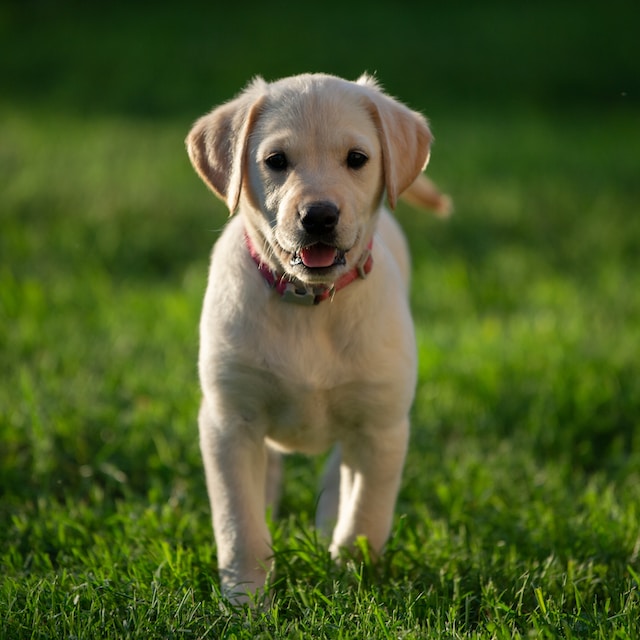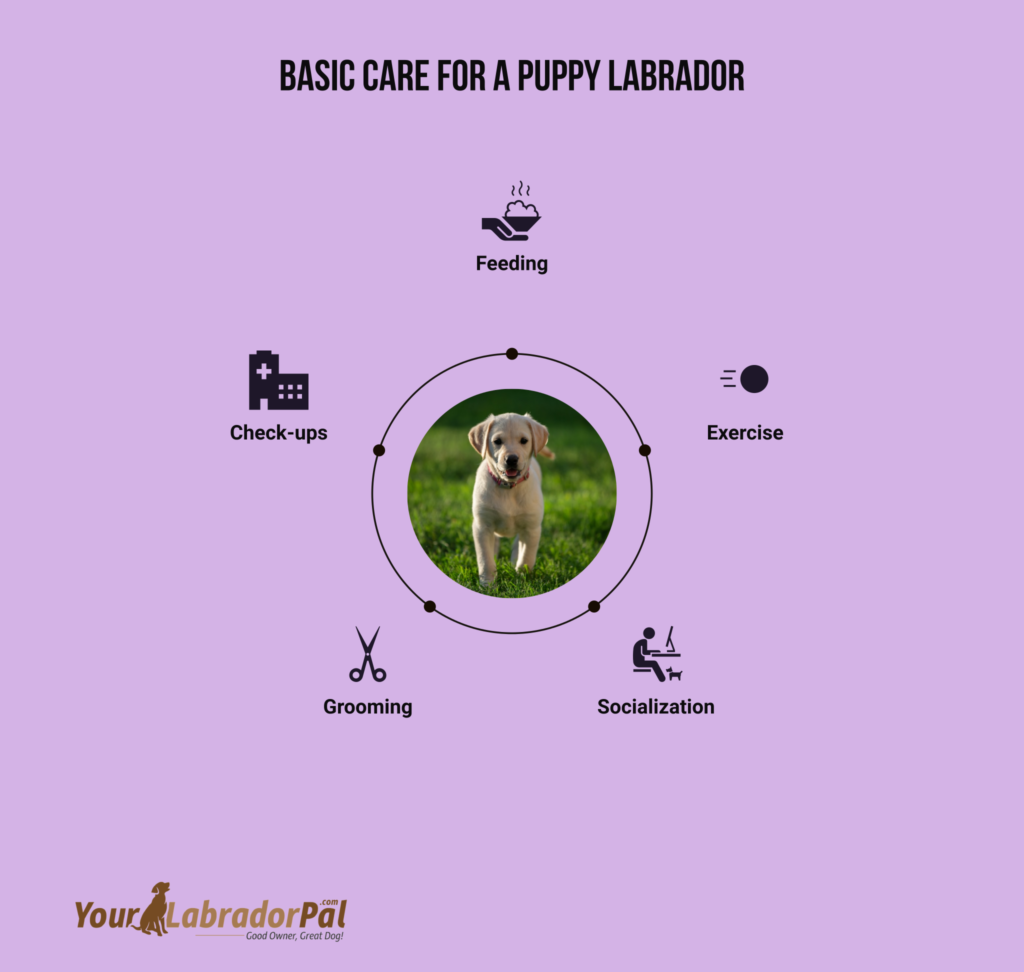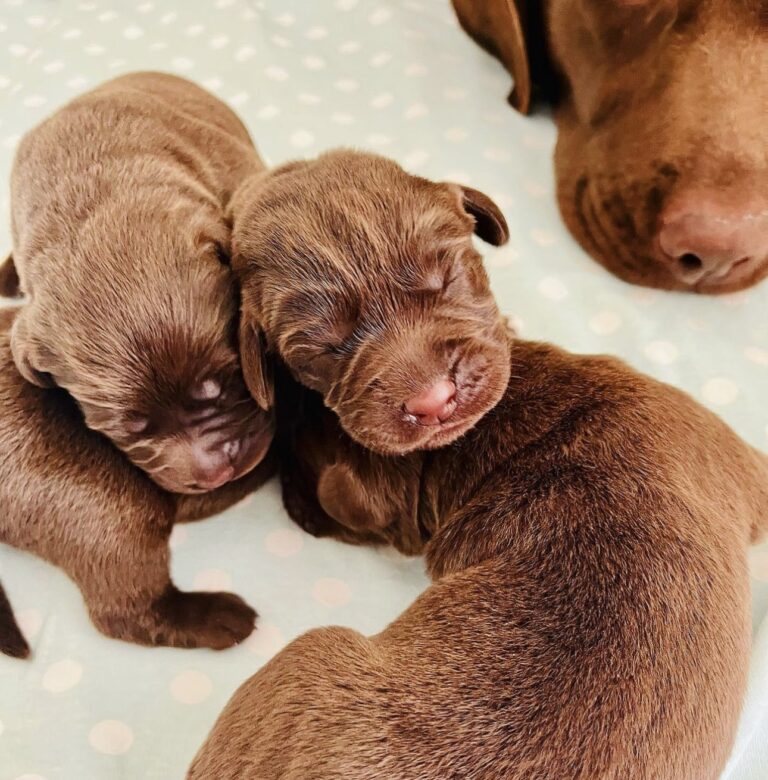Taking Care Of A Puppy Labrador: Expert Tips And Tricks!
There’s nothing quite like the joy of bringing a new puppy Labrador into your life. These adorable and playful animals are known for their boundless energy, loyalty, and affection. However, taking care of a puppy Labrador is also a big responsibility that requires commitment, patience, and knowledge.
In this blog, we’ll guide you through the essential steps of taking care of a puppy Labrador. From nutrition and exercise to grooming and health care, we’ll cover everything you need to know to ensure your puppy grows up healthy and happy.
Whether you’re a first-time puppy owner or a seasoned pet parent, our tips and guidelines will help you provide the best possible care for your furry friend. So, let’s get started on this exciting journey of raising a happy and healthy puppy Labrador!
Common Behavior Problems in Puppy Labrador
Labrador puppies are generally known for their friendly and outgoing nature, but like any other puppy, they can exhibit some common behavior problems that can be frustrating for their owners. Here are some of the most common behavior problems in puppy Labradors:
✤ Biting and nipping
When playing or excited, Labrador puppies may nip or bite, which can be painful and concerning for their owners. To discourage this behavior, redirect their attention to appropriate objects like chew toys or bones. Reward them with praise and treats when they chew on these objects instead of biting or nipping. With consistent training, they will learn that biting and nipping are not acceptable.
✤ Jumping up
Labrador puppies are friendly and full of energy, which can lead to jumping up to greet their owners or visitors. To teach them to greet people politely, give them a command like “sit” when they jump up. Reward them with a treat and praise when they follow the command, and give them attention only when they remain calm and seated.
✤ Chewing
Puppies, including Labradors, have a natural urge to chew on objects, which can lead to destructive behavior. To redirect their chewing behavior, provide them with plenty of chew toys and bones. Supervise them closely to ensure they only chew on appropriate objects. Praise and reward them when they chew on the correct objects, and redirect their attention if they start chewing on something they shouldn’t.
✤ Digging
Labrador puppies love to dig, which can cause damage to lawns and gardens. To redirect their digging behavior, provide them with a designated digging area like a sandbox or a corner of the yard. Encourage them to use this area by hiding toys or treats in the sand. Reward them with praise and treats when they dig in the right spot.
✤ Separation anxiety
Labrador puppies are prone to separation anxiety when left alone, which can lead to destructive behavior and excessive barking. To prevent separation anxiety, gradually acclimate them to being alone by leaving them alone for short periods and gradually increasing the time. Provide them with exercise and mental stimulation to tire them out before leaving. Leave them with toys or puzzles to keep them entertained while you’re away. When you return, greet them calmly and give them attention only when they are calm and quiet.
Basic Care for a Puppy Labrador
Taking care of a puppy Labrador requires dedication and commitment to ensuring that their basic needs are met. Here are some essential things to keep in mind when caring for your puppy:
✓ Feeding
Provide your puppy with high-quality, age-appropriate food and fresh water. Make sure to choose food that is specially formulated for puppies, as their nutritional needs differ from adult dogs. Follow the feeding guidelines provided by the manufacturer and adjust the amount as necessary to maintain a healthy weight. Split the daily portion into several small meals throughout the day to help with digestion and avoid overeating. Clean and refill their water bowl regularly to ensure that they always have access to clean water.
✓ Exercise
Labrador puppies are energetic and require exercise to stay healthy and happy. Take them for daily walks to explore their surroundings and get some exercise. Provide them with toys to play with, such as balls, frisbees, and chew toys. Engage in interactive play sessions with them to keep them mentally stimulated and physically active. Make sure to monitor their activity levels to avoid overexertion and overheating.
✓ Socialization
Socialization is crucial for puppies to develop good behavior and interact well with other dogs and people. Introduce your puppy to different environments, such as parks and other public places, and let them interact with other dogs and people. Make sure that these experiences are positive and rewarding. This will help them develop good social skills and prevent behavior problems in the future.
✓ Training
Puppies require training to learn basic obedience commands and develop good behavior. Use positive reinforcement methods, such as treats, praise, and playtime, to reward good behavior and discourage bad behavior. Teach them basic commands, such as sit, stay, and come, and work on more advanced training as they grow older. Consistency and patience are key when training your puppy.
✓ Grooming
Regular grooming is essential to keep your puppy’s coat healthy and shiny. Brush their fur regularly to remove loose hair and debris, and use a comb to detangle any knots or mats. Trim their nails regularly to avoid overgrowth and potential injuries. Clean their ears with a soft, damp cloth to prevent ear infections, and brush their teeth with a dog toothbrush and toothpaste to maintain good oral hygiene. This will help prevent dental problems and other health issues in the future.
✓ Health check-ups
Schedule regular visits with your veterinarian to ensure your puppy is healthy and up to date on their vaccinations. Watch for any signs of illness or discomfort, such as lethargy, loss of appetite, or vomiting, and seek veterinary care if necessary. Regular check-ups will help prevent health problems and catch any issues early on.
Feeding a Puppy Labrador
Feeding a puppy Labrador is an important aspect of their growth and development. Here are some general guidelines to follow:
✦ Choose a high-quality puppy food
Your puppy’s diet is the foundation of its health and well-being. To ensure they get the best nutrition, look for high-quality puppy food that is specifically formulated for large breeds, such as Labradors. This food should be rich in protein, which supports muscle development, and balanced with healthy fats and carbohydrates. Reading the ingredient list can help you avoid foods with artificial flavors, colors, and preservatives.
✦ Feed small and frequent meals
Puppies have small stomachs, and feeding them multiple small meals throughout the day is better than giving them one or two large meals. This helps prevent your puppy from overeating and can reduce the risk of hypoglycemia (low blood sugar). For example, you could give your puppy three or four small meals spaced throughout the day.
✦ Follow the feeding guidelines
Each puppy food brand has its own feeding guidelines based on your puppy’s age, weight, and activity level. Make sure you follow these guidelines and adjust the amount you’re feeding if needed. Overfeeding can lead to obesity, which is a common health issue in Labradors.
✦ Provide fresh water
Your puppy should always have access to fresh, clean water. Change the water bowl daily, and make sure it’s free of any debris. Clean the bowl regularly to prevent the growth of bacteria.
✦ Monitor your puppy’s weight
As your puppy grows, their nutritional needs will change. It’s important to monitor their weight and adjust their feeding accordingly. If your puppy is gaining weight too quickly, you may need to reduce the amount of food you’re giving them. On the other hand, if your puppy seems to be losing weight or not growing as expected, you may need to increase its food intake.
✦ Avoid table scraps
Although it can be tempting to share your food with your puppy, it’s best to avoid giving them table scraps. Human food can be too rich and high in fat, which can upset their stomachs and lead to obesity. Stick to feeding them their puppy food and appropriate treats.
✦ Consult with your veterinarian
Your veterinarian is your best resource for any questions you may have about your puppy’s nutrition. They can provide you with specific feeding recommendations based on your puppy’s individual needs and health status. They can also advise you on when it’s time to transition your puppy to adult dog food.
By following these guidelines, you can ensure that your puppy Labrador receives a balanced and nutritious diet that supports its growth and development.
Activity and Exercise Requirements of Puppy Labrador

Puppy Labradors are known for their playful and energetic nature. Engaging them in regular activity and exercise is essential for their physical and mental well-being. Here are some guidelines to follow:
◈ Playtime
Puppies are naturally playful and energetic, and playtime is essential for their physical and mental well-being. You can engage them in a variety of activities such as playing fetch, hide-and-seek, or even just running around the yard. These activities help to develop their coordination and provide a great outlet for their energy.
◈ Walking
Walking is a great way to keep your puppy physically fit and mentally stimulated. Short walks of 10-15 minutes a few times a day are recommended for puppies. As they grow, you can gradually increase the duration and frequency of their walks. Walking also provides an opportunity for socialization and exposure to new environments.
◈ Socialization
Socialization is key to ensuring your puppy grows into a well-adjusted adult. This involves exposing them to different people, animals, and environments. You can take your puppy to parks, on walks, or even just out for a ride in the car. Socialization can also involve playtime with other puppies, which is a great way to build their social skills and confidence.
◈ Training
Training your puppy not only improves their behavior but also provides mental stimulation. Teaching them commands and tricks can be a fun and engaging way to exercise their minds. You can also enroll them in puppy classes or obedience training to provide structured activities and socialization opportunities. This will also help your puppy learn important skills like sitting, staying, and coming when called.
◈ Swimming
Labradors are natural swimmers, and swimming is an excellent form of exercise for them. Introduce your puppy to water gradually and supervise them at all times. Swimming also provides a low-impact workout that is great for their joints. You can take them to a lake, or pool, or even just set up a small kiddie pool in your yard.
◈ Rest
Puppies need plenty of rest to support their growth and development. Make sure your puppy has a comfortable and quiet place to rest when they need it. You can provide them with a cozy bed or crate in a quiet area of your home. This will help them recharge their batteries and be ready for their next adventure.
Grooming a Puppy Labrador
✲ Brushing
Make brushing time a fun and relaxing experience for your puppy by rewarding them with treats and praise. Use a soft-bristled brush to massage their coat and stimulate blood flow. This will not only make them look good but feel good too!
✲ Bathing
Turn bath time into a spa day for your puppy! Use a gentle dog shampoo with a pleasant scent and warm water to help them relax. You can also play calming music or offer treats to make it a positive experience.
✲ Nail Trimming
Keep your puppy’s nails short and neat by regularly trimming them. Start by introducing them to the clippers and rewarding them with treats for good behavior. This will help them associate nail trimming with positive experiences.
✲ Ear Cleaning
Make ear cleaning time a bonding experience with your puppy. Talk to them in a soothing voice while gently cleaning the inside of their ears. This will help them feel comfortable and build trust with you.
✲ Teeth Cleaning
Dental hygiene doesn’t have to be a chore! Make teeth cleaning fun by offering your puppy flavored toothpaste or dental chew. You can also play a game of tug-of-war with a rope toy to help clean their teeth.
✲ Eye Care
Keep your puppy’s eyes sparkling and healthy by gently cleaning around their eyes with a soft cloth. Make it a positive experience by offering them a treat or playing with their favorite toy afterward.
✲ Coat Trimming
Give your puppy a fresh and stylish look by trimming its coat. You can create fun and unique styles, such as a “puppy cut” or “teddy bear cut”. Just make sure to consult with a professional groomer if you’re unsure about how to trim your puppy’s coat.
By making grooming time fun and positive, you can help your puppy Labrador develop good grooming habits and build a strong bond with you. It’s also a great way to show them how much you care and keep them healthy and happy!
Mental Stimulation for Puppy Labrador
➼ Puzzle Toys
Introduce a variety of puzzle toys that challenge your puppy’s problem-solving skills and keep them engaged for hours. You can try toys that require your puppy to spin, flip, slide, or manipulate to get to the treats or toys inside. Encourage your puppy with positive reinforcement such as treats and praise when they successfully solve the puzzle.
➼ Training
Make training sessions fun and engaging by incorporating games and rewards. Use positive reinforcement such as treats, toys, and praise to motivate your puppy to learn new commands and tricks. You can also mix up the routine by practicing training in different locations or adding obstacles to the training course.
➼ Socialization
Take your puppy to new and exciting places to meet other dogs and people. Visit local parks, beaches, and dog-friendly cafes to provide new experiences and opportunities for socialization. Encourage positive interactions with treats and praise.
➼ Nose Work
Turn your puppy’s natural instinct for sniffing into a fun game. Use treats or toys to hide around the house or yard and let your puppy use their nose to find them. You can also try scent training by introducing your puppy to different scents and rewarding them for identifying them correctly.
➼ Enrichment Activities
Create new and exciting challenges for your puppy with enrichment activities such as creating an obstacle course or building a DIY treat dispenser. You can also try playing hide-and-seek or treasure hunt with your puppy.
➼ Interactive Play
Play games that stimulate your puppy’s mind and encourage bonding, such as fetch or tug-of-war. Use toys that challenge your puppy’s problem-solving skills, such as toys that dispense treats when played with.
➼ Rotate Toys
Keep your puppy interested and engaged by rotating their toys regularly. Introduce new toys every few days and put away the old ones for a while. This will make them more excited when the old toys come back out and provide new experiences for your puppy.
By providing creative and engaging mental stimulation for your puppy Labrador, you can help them stay healthy, happy, and well-behaved. These activities will not only stimulate their minds but also provide opportunities for bonding and socialization.
Socialization Training for Puppy Labrador
⦿ Puzzle Toys
Introduce a range of interactive puzzle toys that your puppy can play with and solve. You can try toys that require your puppy to nudge, roll, slide, or pull to get to the treats or toys inside. You can also make your own puzzle toys using everyday household items such as muffin tins or cardboard boxes.
⦿ Training Games
Make training sessions fun and engaging by playing games such as hide and seek, fetch, and tug-of-war. Use positive reinforcement techniques such as treats, toys, and praise to motivate your puppy to learn new commands and tricks.
⦿ Socialization Outings
Take your puppy on exciting socialization outings to help them meet and interact with other people and dogs. Visit dog-friendly cafes, beaches, and parks, and encourage positive interactions with treats and praise.
⦿ Scent Work
Turn your puppy’s natural sense of smell into a fun game. Use treats or toys to hide around the house or yard and let your puppy use their nose to find them. You can also try scent training by introducing your puppy to different scents and rewarding them for identifying them correctly.
⦿ Agility Training
Set up an agility course in your backyard or living room to provide your puppy with an exciting physical and mental challenge. You can use household items such as cones, chairs, and boxes to create obstacles.
⦿ Interactive Playtime
Play games with your puppy that challenge their minds and encourage bonding, such as fetch or hide-and-seek. Use toys that stimulate your puppy’s problem-solving skills, such as treat-dispensing toys.
⦿ Novel Experiences
Provide your puppy with new and exciting experiences such as going on a boat ride, visiting a new town, or going for a hike. These novel experiences will help stimulate your puppy’s mind and keep them engaged and happy.
By providing creative and engaging mental stimulation for your puppy Labrador using active voice, you can help them stay healthy, happy, and well-behaved. These activities will not only stimulate their minds but also provide opportunities for bonding and socialization.
Health Care for Puppy Labrador
⚫ Vaccinations
Keeping your puppy up-to-date on their vaccinations is one of the most important things you can do to protect their health. Not only does it protect your puppy from serious diseases, but it also helps prevent the spread of diseases to other animals. Talk to your veterinarian about the recommended vaccination schedule for your puppy and make sure to keep a record of their vaccinations.
⚫ Regular Check-Ups
Taking your puppy to the veterinarian for regular check-ups is crucial for their overall health and well-being. These check-ups allow your veterinarian to monitor your puppy’s growth and development and catch any potential health problems early. Plus, your puppy will get a chance to interact with other dogs and people at the veterinary clinic, which can help with their socialization.
⚫ Parasite Prevention
Parasites such as fleas, ticks, and heartworms can cause serious health problems for your puppy. Preventing these parasites is important for your puppy’s health and comfort. Talk to your veterinarian about the best preventative medication for your puppy, and make sure to check them regularly for any signs of parasites. To make this a more creative and engaging task for your puppy, try using a flea comb during grooming sessions to search for any unwanted visitors.
⚫ Proper Nutrition
Feeding your puppy a well-balanced, age-appropriate diet is key to keeping them healthy and happy. Make sure to choose a high-quality dog food that contains all the necessary nutrients for growth and development. To make mealtime more fun and engaging for your puppy, consider using interactive food puzzles or slow feeders to encourage them to eat at a slower pace.
⚫ Dental Care
Keeping your puppy’s teeth and gums healthy is important for their overall health. Regular dental care can help prevent dental problems such as gum disease and tooth decay. To make dental care more enjoyable for your puppy, try using flavored toothpaste or dental chews. You can also play games with your puppy that involve chewing on dental toys, which will help keep their teeth clean and strong.
⚫ Exercise
Regular exercise is crucial for your puppy’s physical health and mental well-being. It helps them burn off excess energy and maintain a healthy weight. To make exercise more fun for your puppy, try playing games such as fetch or tug-of-war. You can also take your puppy on adventures such as hiking or swimming, which will help keep them physically and mentally stimulated.
⚫ Spay or Neuter
Spaying or neutering your puppy is important for their health and well-being. Not only does it prevent unwanted litter, but it also reduces the risk of certain health problems, such as certain cancers. Talk to your veterinarian about the best time to spay or neuter your puppy, and make sure to follow their post-operative care instructions carefully.
By following these expanded and creative guidelines for health care for your puppy Labrador, you can help ensure that they stay healthy, happy, and well cared for.
Final Words
Taking care of a puppy Labrador is a huge responsibility, but it can also be incredibly rewarding. These loving and loyal animals bring so much joy and happiness into our lives, and it’s important that we do everything we can to give them the best possible care.
By following the guidelines we’ve outlined in this blog, you can help ensure that your puppy grows up healthy, happy, and well-adjusted. From proper nutrition and exercise to socialization and mental stimulation, every aspect of your puppy’s care is important for its overall well-being.
Remember, taking care of a puppy Labrador is a lifelong commitment. But with patience, love, and plenty of snuggles, you’ll find that the rewards of caring for a puppy Labrador are more than worth it.
So go ahead and embrace the journey of raising your puppy Labrador! And if you ever need help or have any questions, don’t hesitate to reach out to your veterinarian or trusted animal care professionals. With the right care and attention, your puppy will grow into a loyal and beloved companion for many years to come.










